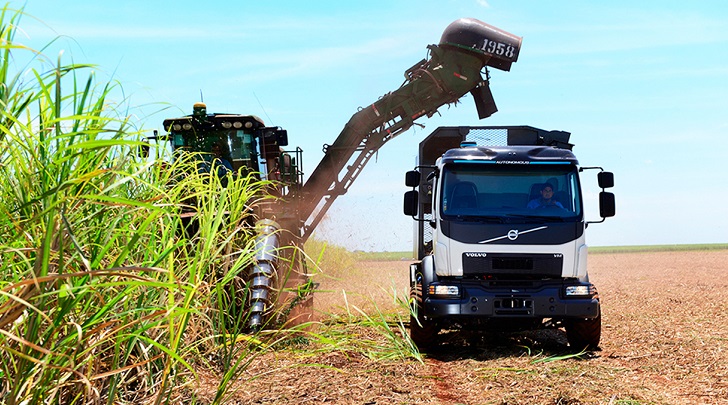Volvo test self-steering truck in Brazil

Volvo Trucks has been testing a self-steering truck which, it hopes, can boost productivity for Brazilian sugar cane growers.
For the past growing season, Volvo Trucks has been testing a prototype in the sugar cane fields in Maringa owned by the Usina Santa Terezinha Group. The truck is used to transport newly harvested sugar cane through the fields with precision to avoid damaging young plants that will form the following year’s crop. Currently, about 4% of the crop is lost from being run over and the soil being compacted – which can mean tens of thousands of dollars of potential revenue lost per truck per season.
The truck was developed to examine how automated driving can make it possible to avoid damage to soil and crops, thus boosting revenues.
Currently, sugar cane is brought in from the fields using harvesters and manually controlled trucks, which drive alongside each other at a low speed. When a truck is fully loaded and drives off to empty its load, the next one moves up next to the harvester and the procedure is repeated. The challenge for the truck driver is to match the harvester’s speed and at the same time concentrate on driving in its tracks, so as not to trample on the nearby plants.
To try and overcome this, Volvo’s prototype uses a driver assistance system that automates steering. It ensures the truck maintains exactly the right course when driving to, alongside and away from the harvester, so plants are not damaged. The truck follows a coordinate-based map – aided by GPS receivers – across the fields. Meanwhile, two gyroscopes ensure that the truck does not veer more than 25mm laterally from its set course.
When loading, the driver can choose to regulate speed with the help of the vehicle’s cruise control or to accelerate and brake manually. As the driver doesn’t have to concentrate on the precision steering process, Volvo said it is easier to remain focused and work in a more relaxed and safe way throughout the shift.
“With this solution we will soon be able to significantly increase the productivity of our customers in the sugar cane industry,” said Wilson Lirmann, President of Volvo Group Latin America. “At the same time, we will improve their drivers’ working conditions and safety. This in turn will make the job more appealing, and make it easier to recruit and maintain drivers.”
This summer the research project will transition into the product development phase, with more vehicles being field-tested. After that, Volvo says the self-steering truck can be expected to become commercially available in the foreseeable future.
In Sweden, Volvo is also testing an autonomous truck for mining operations and an autonomous refuse collection truck. The aim is to evaluate how systems with different degrees of automation can contribute to higher productivity, a better working environment and improved safety.
We hope you enjoyed this article! For more news, views and reviews on all aspects of the truck driver’s life subscribe today.
